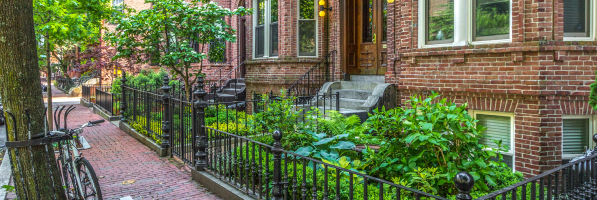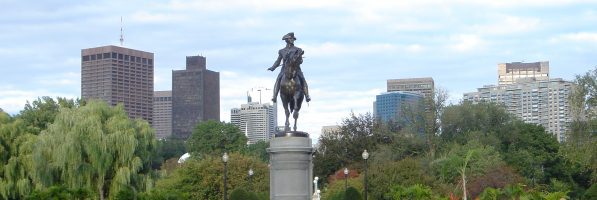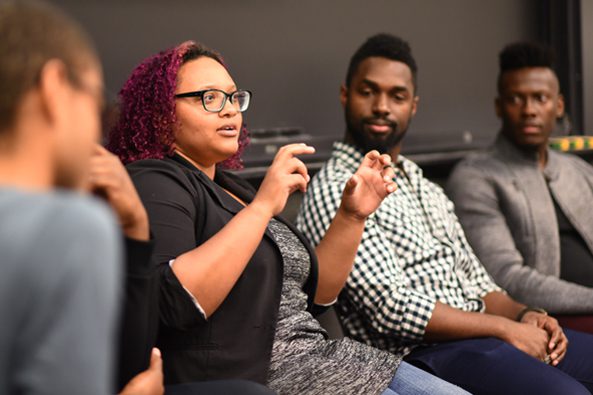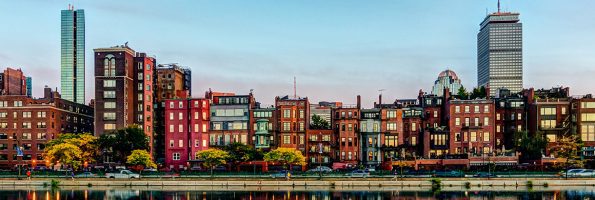What are the Best Real Estate MBAs in Boston?

Despite episodic waves of unrest, real estate is a worthy investment. More importantly, real estate is a cornerstone of the world economy. The importance of understanding the intricacies and nuances of this complex field cannot be overstated.
In Forbes, Yolanda Barnes, who runs Savills World Research, said, “real estate is the pre-eminent asset class which will be most impacted by global monetary conditions and investment activity and which, in turn, has the power to most impact national and international economies.” For the B-school-bound, becoming fluent in real estate’s many facets can provide a valuable edge in nearly every area of business.
Below, we’ve laid out the best Boston real estate MBA options for those looking for careers in the industry.
Harvard Business School
It would be remiss to talk about business education in Boston without mentioning Harvard Business School. HBS is easily one of the most reputable business schools in the world. Forbes places the university in its top three “Best Business Schools.” For those pursuing real estate, Harvard MBA’s have access to the Harvard Business School Real Estate Club, which provides its members with opportunities for supplemental real estate education, training, and extensive networking. Harvard also hosts an annual Real Estate Weekend, wherein students can buy tickets to attend development workshops and fireside chats with industry experts.
F.W. Olin Graduate School of Business – Babson College
At Babson College’s F.W. Olin Graduate School of Business, MBA students can pursue the finance concentration, which offers several courses in real estate. Students can rake courses like Real Estate Financial Modeling, Real Estate Fundamentals, or Real Estate Development. According to recent Olin graduate employment statistics, 10 percent of the 2017 MBA class landed jobs in real estate. This number may not seem overwhelming, but it dwarfs the percentage seen in many MBA programs (usually about two to three percent).
Sloan School of Management – MIT
MIT’s Sloan School of Management offers an MBA that incorporates real estate education. Though the school also offers an MS in real estate development (MSRED) for those more focused on earning a degree in real estate than an MBA, the MBA finance track offers a different set of advantages. This track zooms in on the finance-related areas of real estate, such as investment, urban economics, and housing economics. The MBA real estate courses zero in on the financial component of the industry and the core MBA courses also help students build a broad foundation in business. MBA students pursuing a certificate in finance can take courses like Real Estate Finance and Investment and Real Estate Capital Markets.
Harvard Talks Analytics, MIT Explores Diversity in Tech, and More – Boston News

Let’s explore some of the most interesting stories that have emerged from Boston business schools this week.
Should an Algorithm Tell You Who to Promote? – Harvard Business Review
Professor of human resource management Jeffrey T. Polzar published a fictionalized case study that illuminates the influential role that “people analytics” algorithms play in steering hiring managers to which hot new talent. In a recent interview with Harvard Business Review, Polzar said:
“The day after Anne’s farewell party, Aliyah met with Christine and Brad Bibson, a data scientist on the people analytics team. ‘We’ve just started looking at networks,” Brad said, ‘and we think they can reveal some useful information. These are network analyses based on Molly’s and Ed’s e-mail and meeting history at BBI. With their permission and without looking at the content of their e-mails or calendars, we analyzed who they had been in contact with across the firm over the past six months.'”
Explore more of the fictionalized case study here.
Diversity in Tech a “People Problem” In Need of a Management Solution – MIT Sloan Newsroom
The MIT Sloan Coders Club recently hosted the Black in Tech and Entrepreneurship panel, in which a group of five entrepreneurs and engineers “shared experiences and offered suggestions on what tech companies can do to diversify their workforces and diminish bias.” Adam Taylor, founder of news app Black, explains:
“It is a people problem. When you think about the people that are on your teams professionally, how would you hire someone to work with you every day for however long they’re with your company? You tend to hire people you’re comfortable with.”

Students Roderic Morris of Drift, Amal Hussein, Nana Essilfie-Conduah, and Adam Taylor / Photo via Mimi Phan
Read more about this diverse take on tech’s diversity issue here.
AI Knows What Customers Want, Transforms Supply Chains – D’Amore-McKim Blog
D’Amore-McKim’s distinguished professor of supply chain management Nada Sanders uses Spanish “fast fashion” company Zara as the shining example of an optimized supply chain that uses artificial intelligence to drive customer satisfaction. In fact, many other businesses have begun to crib notes.
“Seven-Eleven Japan has taken lessons from Zara, using technology to microsegment demand and to understand what customers want. They will literally reshuffle and change what the merchandising looks like in the course of one day, in one location, for different segments of customers.”
Read more about professor Sanders’ research here.
Babson Reveals New Scholarships, Rankings, for Blended Learning MBA – MetroMBA
MetroMBA recently spoke with F.W. Olin Graduate School of Business faculty director Phillip Kim about the shape of the Babson Blended Learning hybrid online MBA program, shortly after the school earned some high praise from the likes of the Financial Times.
“Our program integrates the best of the ‘full-time’ graduate experience with a delivery format designed for working professionals, whose time is at a premium. Our students can complete their MBA in 21 months while working full-time. They learn from accomplished faculty, who are experts in their own disciplines and translate academic concepts into practical takeaways for our students. We are also the number one school for entrepreneurship education, and this ethos is infused throughout the program.”
Read more of our interview with Kim here.
How Boston Business Schools Help Low-Income MBA Applicants

Anyone planning on earning a postgraduate business degree knows that MBA programs cost a lot of money. In the Boston metro, where the cost of living is already high, the annual cost of an MBA program can reach upward of $100,000 … Ouch! Continue reading…
Philadelphia or Boston? Where’s the Best Place to Earn a Part-Time MBA

If you are interested in pursuing a degree in a diverse East Coast city, want to be surrounded by history and culture, and still immerse yourself in growing business community, two main cities come to mind: Philadelphia and Boston.
Both cities are at the center of U.S. history, and continue to be some of its largest centers of commerce and academia, with numerous opportunities to put its stellar education to work.
Surrounded by so many possibilities for professional development, an MBA student in a city like Philadelphia or Boston may not want to put their career and income on hold to pursue a full-time degree.
Thankfully, many of the business schools in Philadelphia and Boston offer part-time MBA programs, allowing students more flexibility as they kick off their careers in these exciting cities. But how to decide which one? We’ll take a look at some of the top part-time MBA programs in each metro to help you choose the right city for you.
Location
Once the capital of the United States, Philadelphia has never stopped being a center of both business and history since the time it played host to the country’s founding fathers. Home to some of the oldest and best universities in the country, Philadelphia has experienced a renaissance in recent years as young talent has become priced out of more expensive metros like New York City and Washington DC. The cost of living in Philadelphia remains fairly low, while the ever-growing business scene in the city offers the opportunity for high earning potential. This year, 14 Philadelphia-area companies made the Fortune 500 list.
Like Philadelphia, Boston has been a center of commerce and trade since the days of the Boston Tea Party. Today, the city is home to nine Fortune 500 companies, including major established firms like GE (13th on the Fortune 500 list) and newer but thriving businesses like Wayfair. However, Boston has a much higher cost of living than Philadelphia. The city currently ranks as the third most expensive city in the country.
Programs
Between the Wharton School of Business and the Harvard Business School, Philadelphia and Boston offer two of the most highly regarded MBA programs in the country. However, both of these schools only offer full-time MBA programs. Students looking for more flexibility in their schedules still have a number of stellar programs to choose from.
Most of the part-time MBA programs in the Philadelphia metro work on a hybrid structure, allowing students to take a combination of classes both online and in person. Many programs also offer students the chance to select majors or concentrations in which to specialize their business education. With a variety of possible concentrations at some of the most highly-ranked part-time programs in the country, students from these programs have gone on to find employment at major firms like DuPont, KPMG, and JPMorgan Chase.
Part-Time MBA Programs in Philadelphia Include
- Lehigh University College of Business and Economics
- Fox School of Business – Temple University
- La Salle University
- LeBow College of Business – Drexel University
- Lerner College – University of Delaware
- Rohrer College of Business – Rowan University
- Rutgers School of Business, Camden
- Villanova School of Business
- West Chester University
Like Philadelphia, Boston’s part-time MBA programs offer more flexibility for students to complete their degree on their own time. Most courses are offered in the evening or on weekends, and can be taken over the course of just two years or up to seven. Programs like the MBA at D’Amore-McKim also give students the opportunity to concentrate in fields such as Corporate Finance, Corporate Renewal, Entrepreneurship, and more.
Part-Time MBA Programs in Boston Include
- Carroll School of Management – Boston College
- D’Amore-McKim School of Business – Northeastern University
- F.W. Olin Graduate School of Business – Babson College
- Questrom School of Business – Boston University
- Sawyer Business School – Suffolk University
- Simmons School of Management
Cost
The tuition costs can vary from program to program, and can also be cheaper if the part-time program is competed online. On average, programs in the Philadelphia metro area can range from $45,000-$65,000 for the degree. The range of costs in Boston can be slightly higher, with some students spending up to $95,000 over the course of their degree.
Jobs
Although the cost of an MBA in Boston may be slightly higher than Philadelphia, the difference in average salary between the two cities may even out concerns of cost. In Boston, the average salary for someone with an MBA degree in a field like finance is $112,000, whereas in Philadelphia it is only around $90,000 per year.
Searching for the Perfect 1-Year MBA in Boston

Not everyone has two years to dedicate toward earning an MBA. For some, maybe a year is just a better option. Luckily, Boston has more than enough options for those who would rather trek down the one-year path.
Currently, Boston is the 20th most populous city in the U.S., with its historical roots grounded in advanced academia. It has proven to be a perfect home for students, with a population that skews young. Almost one out of every three residents is between the ages of 20 and 34.
The largest employers might be hospitals like Brigham & Women’s Hospital or Massachusetts General Hospital, but the coastal city’s true jewels are its universities like Harvard and MIT. While most schools in the area offer MBA programs, not all offer options that’ll allow students to graduate with an MBA within one year. Below, we outlined some of the best Boston 1 Year MBA program opportunities.
F.W. Olin Graduate School of Business — Babson College
The F.W. Olin Graduate School of Business isn’t too old; it’s been around since 1947. Students can take its one-year MBA program on its main campus in Wellesley, Massachusetts. It’s about 14 miles away from Boston, so students will still be just a short drive away.
The program takes 12 months, but students can build close bonds with each other in this short period of time. This program’s participants operate as a cohort, but they also get the chance to mingle with some students in the school’s two-year and evening MBA programs. All MBA candidates have the opportunity to participate in Signature Learning Experiences, a hands-on approach to education that prepares students for real-world situations.
Sawyer Business School — Suffolk University
The Sawyer Business School isn’t as old as the university, but that hasn’t stopped it from getting recognized. The school began to offer an MBA in 1948 and never quite began to offer a formal one-year MBA program, but it does offer accelerated ones.
Sawyer has a couple accelerated MBA programs: one for attorneys and for certified public accountants. The way it works is that students enter the program with credits already under their wing. The catch is that students complete a certain number of credits in the business school—but these could have been before chasing an MBA. It all really depends. That’s 37 credits for attorneys; 34 for CPAs.
MBA candidates with an interest in law can also learn a concentration while at the school. Courses include an immersive, travel seminar. As for CPA candidates, their curriculum is nearly identical to the attorney pathway. The only difference is one class required for the attorney curriculum and not the CPA: Corporate Financial Reporting and Control.
Sloan School of Management — MIT
MIT may mostly be known for tech industry and Good Will Hunting scenes, but its Sloan School of Management is frequently ranked as one of the best in the world by esteemed publications like The Economist. While Sloan doesn’t exactly offer a one-year MBA, its MIT Sloan Fellows Program only takes one year—and fellows walk away with an MBA.
The school calls the program a “change-the-world toolkit.” Mid-career managers from around the world are invited to apply for the fellowship. Once accepted, fellows arrive in April and begin their journey together. They take summer courses, fall courses, and some during the spring too. There’s an optional independent activities period where fellows can take part in a four-week term made up of how-to sessions, forums, or tours for 12 credits max.
San Francisco’s Top 3 Economics MBA Programs

When it comes to learning about economics, what better place than Silicon Valley?
San Francisco holds a number of schools that offer an MBA with a focus on economics. The Bay Area is not just a place of lax tech bros though. It’s a place booming with culture and treasures like the Golden Gate Bridge and the Pacific Coast Highway. The beach isn’t too far, either.
But if you are looking for a place to build a resume, San Francisco is it: It ranks among the nation’s best performing cities. San Francisco is also second among cities in the U.S. for GDP growth associated with tech firms.
While many schools in the area hold prestigious MBA programs, here are the top three for where to obtain an economics MBA.
Haas School of Business – UC Berkeley
The Hass School of Business at UC Berkeley has been around for nearly 30 years, since 1989. The Berkeley name itself holds a sense of prestige, but the Haas School even more so. It’s the oldest business school at a public institution. That’s something.
As for its MBA programs, the Haas School offers a full-time, Executive, and a part-time MBA, for which students can take classes in the evening or on weekends. The full-time MBA takes two years and includes a variety of focus areas students can do via electives. One area of focus is economic analysis and policy.
This focus gives candidates that economic edge needed to make it in the field. This focus starts from a student’s first year though the electives tend to become more dominant in the second year. The courses make up 60 percent of the curriculum. Some of these electives use a macroeconomic lens to look at the global economy. Others look at the housing and urban economy from the viewpoint of investors and real estate developers.
Recruiters have come to Haas from healthcare, internet, and solar companies. The program takes just 275 students a year. Those interested in the Haas School of Business must apply by Sept. 21.
Stanford University Graduate School of Business
The Stanford University Graduate School of Business came about after former U.S. President Herbert Hoover, a Stanford alum, helped created the business school in 1925. About 800 students are enrolled in the program at a given time. Sometimes, the program could hold half that size. The Class of 2018 enrollment featured more than 417 students.
The noted university offers a single, full-time MBA program. The business school ensures its curriculum is flexible to fit every student’s needs. By the end of their first quarter, students develop a personalized plan for their foundational courses. That way, they get the basics down before moving onto establish their focus with their experience and goals in mind.
For those interested in economics, Stanford offers two types of expertise: political economics and managerial economics. Here, students can learn about financial crises, contemporary economic policy, managing global political risk, and many more topics.
F.W. Olin Graduate School of Business – Babson College San Francisco
The F.W. Olin Graduate School of Business at Babson College’s San Francisco campus opened not too long ago, in 2011. It offers a unique blended learning program. Not all students can manage the time to come into a classroom. This program is flexible and blends online classes with in-person classes every seven weeks on Fridays and Saturdays.
Core classes get into the nitty gritty all business students need: financial reporting, managing talent, strategy, and others. But students also get the opportunity to take a series of Signature Learning Experiences that take students outside the classroom and into a hands-on learning environment.
Course topics vary from a myriad of things—and economics is among them. The core courses include one on managerial economics and another on how to apply data to economics. The school also gives economics classes about game theory, trade, globalization, and health economics.
